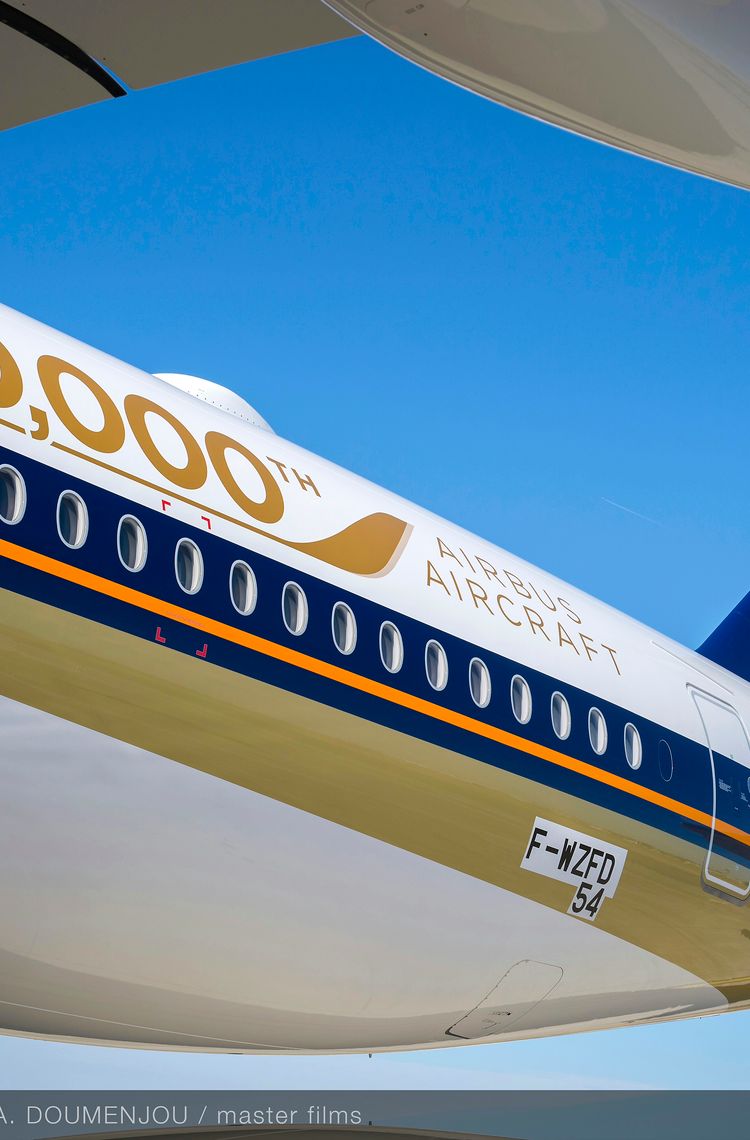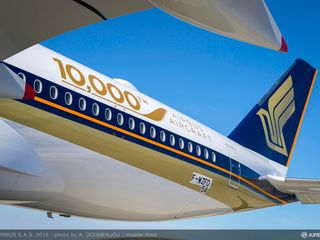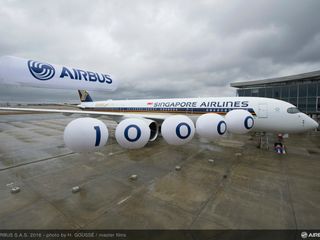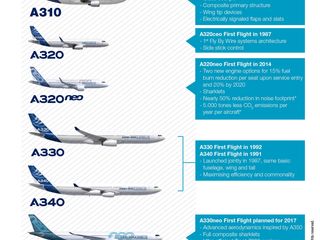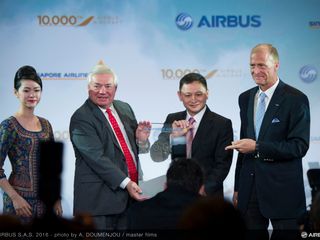Driven by a passion for aviation and a desire to create better ways to fly, the over-four-decade-long Airbus success story is now an achievement that spans 10,000 aircraft – from the A300 to the A350 XWB and beyond.
With the handover of an A350-900 to Singapore Airlines today, Airbus marked the 10,000th aircraft provided to worldwide customers since the aircraft manufacturer’s initial delivery in 1974. This accomplishment underscores the company’s ongoing growth that has transformed a European upstart in the 1970s to a global market leader now offering a modern and comprehensive product line ranging from 100 to more than 600 seats.
“Building and delivering 10,000 aircraft is a remarkable achievement and important step in our journey reflecting the hard work, dedication and creative thinking of Airbus employees past and present,” said Fabrice Brégier, Airbus President and CEO. “As we prepare for the future ahead, this spirit will continue to be a key part of our ongoing success.”
Continuous leadership
Deliveries of every Airbus “family” member have contributed to this milestone – from the cornerstone medium-haul A300 and A310 to the best-selling single-aisle A320 product line, long-range A330/340 Family, new-generation A350 XWB and double-deck A380.
Throughout Airbus’ history, these commercial aircraft have been connected by the shared values of continuous innovation, unmatched operational efficiency and superior comfort – characteristics which operators and passengers around the globe have firmly endorsed.
To date, the global Airbus fleet has performed more than 110 million total flights and flown some 215 billion kilometres (enough distance to travel from the Earth to the Sun some 1,500 times). Airbus aircraft have carried over 12 billion passengers in commercial service – a figure representing approximately twice the world’s population.
A record-breaking family of aircraft
Each member of Airbus’ product line also is a “record-breaker” – starting with the A300, the first widebody, twin-engine jetliner. The A320 Family currently holds the mark as the most common aircraft in commercial service, while the A330 Family last year flew more flights than any other widebody.
The A340 is the record holder for performing the longest-ever regularly scheduled non-stop passenger service: a 15,000-plus-km. fight between Changi Airport and Newark operated by Singapore Airlines. The A350 XWB is ready to follow in these footsteps with the A350-900 Ultra Long Range version, which Singapore Airlines has selected to resume service from Singapore to the New York area.
Rounding out Airbus’ record-breaking fleet is the A380, which is the largest aircraft in commercial service and flies eight of the 10 longest routes operating today.
Success that spans the globe
Deliveries of Airbus aircraft have been received by customers in all regions of the world – led by the Asia-Pacific and followed by Europe, North America, Latin America and the Caribbean, the Middle East and Africa, along with handovers to lessors, government and private jet operators.
In turn, Airbus has developed its production facilities on an international scale to increase capacity and remain even closer to customers. With expansions of its European manufacturing and final assembly sites, as well as the opening of new final assembly lines in the U.S. and China for the A320 Family, the sun never sets on Airbus’ network.
This growing global network is driving the company’s increase in production output – highlighted by the fact that Airbus’ 10,000th delivery is occurring just over a year and half after its 9,000th handover.
Shaping the future
At current production rates, Airbus expects to deliver its 20,000th aircraft in approximately a decade – taking about one fourth of the time to produce its second 10,000 jetliners as compared to the first 10,000.
Among these future deliveries will be a new generation of Airbus aircraft entering service – including such latest-launched products as the A320neo (new engine option), A330neo and A350 XWB. These aircraft are ready to once again help Airbus set new standards in air travel and carry the company’s success forward.
“Our desire to further transform the industry is undiminished,” said Didier Evrard, Airbus Executive Vice President – Head of Programmes. “We will continue to improve environmental performance, reduce noise, develop new services and enhance operational capabilities. We’ll strive to stay at the forefront when it comes to connected aircraft, passenger comfort, and adopting disruptive technologies”

